Donald Rumsfeld
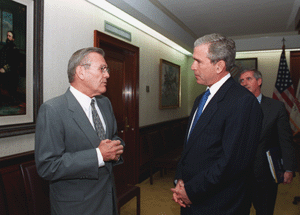 As a Princeton University wrestler 50 years ago, Donald Rumsfeld was famous for using the fireman's carry as his finishing move. But these days, Rumsfeld is a hardcore hero, more than likely to grab a steel chair in his quest to lay the smackdown on Saddam Hussein.
As a Princeton University wrestler 50 years ago, Donald Rumsfeld was famous for using the fireman's carry as his finishing move. But these days, Rumsfeld is a hardcore hero, more than likely to grab a steel chair in his quest to lay the smackdown on Saddam Hussein.
The cantankerous Rumsfeld has charmed the Washington press corp with his microphone skills. But the former captain of industry will really test his ring skills in the big match with Iraq, coming soon to an arena near you.
A Chicago native, Rumsfeld had a middle class upbringing which mixed all-American athleticism with academic acumen sharp enough to win a scholarship to Princeton. He went to the same high school as Ann-Margaret, Rock Hudson, Charlton Heston and Christie Hefner.
After Princeton, Rumsfeld entered the Navy, where he was known as an aggressive pilot and a champion wrestler, until a shoulder injury put an end to his Olympic hopes. With a glamorous wrestling career now closed to him, Rumsfeld naturally turned to the next best thing, politics.
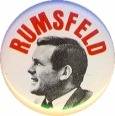 In 1962, Rumsfeld won a long-shot run for the House, where he distinguished himself as a liberal Republican with his support for civil rights. After Goldwater's defeat in 1964, Rumsfeld helped lead a block of moderate Republicans to install Gerald Ford as minority leader. He joined the Nixon administration in 1969, serving in a series of non-criminal positions including economic advisor and ambassador to NATO (although he did appear on a few tapes).
In 1962, Rumsfeld won a long-shot run for the House, where he distinguished himself as a liberal Republican with his support for civil rights. After Goldwater's defeat in 1964, Rumsfeld helped lead a block of moderate Republicans to install Gerald Ford as minority leader. He joined the Nixon administration in 1969, serving in a series of non-criminal positions including economic advisor and ambassador to NATO (although he did appear on a few tapes).
When Nixon went up in flames, Rumsfeld came in to help pick up the pieces, first as Ford's chief of staff and later in his first stint as Defense Secretary. In 1977, he was awarded the prestigious Presidential Medal of Freedom for not fucking up too much while executing these important positions.
Rumsfeld might have been a moderate compared to Barry Goldwater, but over the years, his political profile moved to the right, whether as a function of relativity or driven by a actual change in attitude. Illustrative of this point, legend has it that Henry Kissinger describes Rumsfeld as the most ruthless man he ever met (and this is a guy who met Mao Tse-Tung and Augusto Pinochet, not to mention himself).
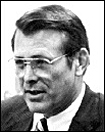 As the fabulous Ford years drew to a close, Donny R. chose to return to the private sector, focusing on super-lucrative jobs in pharmaceuticals and technology. Although he had no previous business experience, Rumsfeld beefed up his resume with implied political influence by simultaneously serving in a variety of government posts. He served in nearly a dozen special postings of one sort or another from 1982 to 2000.
As the fabulous Ford years drew to a close, Donny R. chose to return to the private sector, focusing on super-lucrative jobs in pharmaceuticals and technology. Although he had no previous business experience, Rumsfeld beefed up his resume with implied political influence by simultaneously serving in a variety of government posts. He served in nearly a dozen special postings of one sort or another from 1982 to 2000.
Perhaps the most memorable of these roles came during the Reagan administration, when Rumsfeld was named special presidential envoy to the Middle East. According to the Washington Post and others, Rumsfeld was a major proponent of the Reagan administration's support of Iraq and its dictator Saddam Hussein.
As a conciliatory gesture, the U.S. removed Iraq from its list of state sponsors of terrorism in 1982, paving the way for Rumsfeld to visit Baghdad in 1983, about the midpoint of the decade-long Iran-Iraq war.
At the time, intelligence reports indicated the Iraqis were using illegal chemical weapons against Iran "almost daily." During several trips to Iraq, Rumsfeld told government officials that the U.S. would consider an Iraqi loss to Iran a major strategic defeat. In a personal meeting with Saddam Hussein in December 1983, Rumsfeld told the Butcher of Baghdad that the U.S. wanted to restore full diplomatic relations with Iraq.
In 2002, Rumsfeld tried to put a gloss on this meeting by claiming that he warned Hussein against using banned weapons, but that claim was unsupported by the State Department's notes on the meeting.
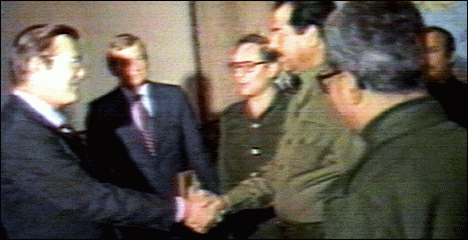 As a result of the openings created by Rumsfeld's diplomatic triumphs, U.S. companies were recruited and encouraged, both covertly and overtly, to ship poisonous chemicals and biological agents to Iraq, by the administrations of both Reagan and George Bush Sr.. Care packages to Saddam included sample strains of anthrax and bubonic plague, and components which would be used to develop nerve poisons like sarin gas and ricin.
As a result of the openings created by Rumsfeld's diplomatic triumphs, U.S. companies were recruited and encouraged, both covertly and overtly, to ship poisonous chemicals and biological agents to Iraq, by the administrations of both Reagan and George Bush Sr.. Care packages to Saddam included sample strains of anthrax and bubonic plague, and components which would be used to develop nerve poisons like sarin gas and ricin.
Content with this service to his nation, Rumsfeld hoped to return to his game of hopscotch between the public and private sectors. He toyed with a 1988 presidential run, but bowed out in favor of Bob Dole. Dole got his his ass handed to him in the primaries by George Bush Sr., who subsequently snubbed Rumsfeld by cutting off his feed-trough of influence-peddling appointments.
In 1996, Rumsfeld once again bet on Dole, and once again found himself on the losing side. However, Bill Clinton was more magnanimous in victory than Bush had been. In 1999, Clinton tapped Rumsfeld to lead a commission looking into the feasibility of a national missile defense system, which the commission eventually supported.
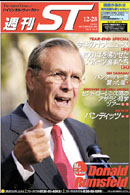 George W Bush arrived in Washington, D.C., in 2000. He appointed Rumsfeld to revamp the army for the 21st Century. Seeing a world largely at peace, Rumsfeld made a name for himself as a reformer when he challenged basic assumptions about Defense spending, such as the premise that the Army should be prepared to fight two wars simultaneously in different parts of the world.
George W Bush arrived in Washington, D.C., in 2000. He appointed Rumsfeld to revamp the army for the 21st Century. Seeing a world largely at peace, Rumsfeld made a name for himself as a reformer when he challenged basic assumptions about Defense spending, such as the premise that the Army should be prepared to fight two wars simultaneously in different parts of the world.
But on September 11, 2001, the world suddenly looked a lot more dangerous. Hell, maybe the ability to fight two wars simultaneously wasn't enough. After terrorists crashed two hijacked planes into the World Trade Center towers, Rumsfeld set up an emergency position near the Pentagon, which was subsequently hit by a third plane. Rumsfeld nixed a plan to evacuate the center, even as the air filled with smoke. According to the Defense Department, Rumsfeld rushed to the crash site against the urging of security personnel and helped evacuate the wounded.
September 11, and the resulting invasion of Afghanistan, made Rumsfeld into a star. His daily briefings were as popular as the Tonight Show monologue, and twice as entertaining. Striking a colorful balance between crude violence and clever wordplay, Rumsfeld made it clear that professional wrestling had lost a first-class superstar the day Donny threw his shoulder out.
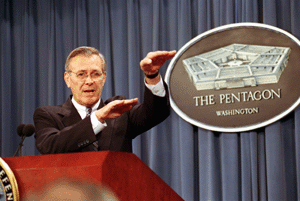 Some Rumsfeld zingers compiled by a variety of sources include:
Some Rumsfeld zingers compiled by a variety of sources include:
- "I'm not into this detail stuff. I'm more concepty."
- "(Osama bin Laden is) either alive and well or alive and not too well or not alive."
- "If you are not criticized, you may not be doing much."
- "Let's hear it for the essential daily briefing, however hollow and empty it might be. We'll do it."
-
"I can't think of anything funnier than a handful of congressmen walking around (in Iraq). They'd have to be there for the next 50 years trying to find something. It's a joke."
- "Oh, Lord. I didn't mean to say anything quotable."
And so on. With all this energy directed toward quipsterism, one might wonder how Donald Rumsfeld rates as an actual Secretary of Defense. After all, history's shortest war — the eviction of the Taliban from Afghanistan — took place under his watch. As Defense (or at least "the best defense" vis a vis a "good offense") goes, that's not too shabby.
By all reports, Rumsfeld runs as tight a ship as one might infer from his odd combination of prissiness and crankiness. He gets up at the crack of dawn and goes to work, where he stands behind a small metal desk firing instructions off to all corners via dictaphone.
Rumsfeld generally gets good marks from the media, although the aforementioned charm may have something to do with that. Most reports indicate he played a major role in dictating broad strategy during the Afghan war while leaving battlefield tactics to the commanders. His Baywatch-style heroics during the Pentagon attack deservedly inspired deep loyalty among the men and women he commands. Even with a war on the ground, and another up and coming, he has doggedly continued pre-9/11 reforms designed to revamp the armed forces for the new millennium.
Shortly after 9/11, Rumsfeld was polling better than 80% in terms of public sentiment about his job performance, roughly charting alongside his commander-in-chief. His outlook for the future depends largely on how the war with Iraq plays in Peoria. Along with Dick Cheney, Rumsfeld has been one of the most strident advocates for bombing the shit out of his former dinner companion, Saddam Hussein.
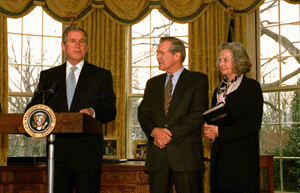 As with the Afghan war, the Iraq scenario is once again following the "Rumsfeld strategem" — a stealthy pre-invasion invasion to soften up the target so that the official media sanctioned invasion looks better than anyone could have imagined. In Afghanistan, Rumsfeld moved air power and fighting troops into combat well before the U.S. ever admitted the war had begun. The result? A six-month war that looked like it only took two months.
As with the Afghan war, the Iraq scenario is once again following the "Rumsfeld strategem" — a stealthy pre-invasion invasion to soften up the target so that the official media sanctioned invasion looks better than anyone could have imagined. In Afghanistan, Rumsfeld moved air power and fighting troops into combat well before the U.S. ever admitted the war had begun. The result? A six-month war that looked like it only took two months.
By February 2003, U.S. special forces were already on the ground in Iraq, and air strikes by allied forces had more than tripled from the "frequent squabbling" engagement of the last dozen years. By the time the photo-op first strike is fired for the sake of the history books, the U.S. could have overrun half the country.
That's contingent on a win, of course. When reporters asked in early March whether he was worried about Iraq becoming a "quagmire" (a question frequently posed in relation to Afghanistan), Rumsfeld responded, "I can almost promise you that someone in this room will say it's a quagmire."
If Afghanistan was the "Royal Rumble" for this former wrestler, the Bush administration's intense focus has made Iraq into the main event at "Wrestlemania," with the championship belt on the line. Rumsfeld and Saddam even have the kind of history usually reserved for wrestling storylines — once buddies in mayhem, now they're on opposite sides.
Timeline
| 9 Jul 1932 |
Donald Rumsfeld born in Chicago, IL. |
| 1949 |
Boy Scout Donald Rumsfeld earns the rank of Eagle. |
| 1954 |
B.A. in Politics, Princeton. |
| 1962 |
Elected to the House of Representatives for four terms. |
| 1973 |
Named Ambassador to NATO. |
| 27 Sep 1974 |
President Gerald Ford appoints Donald Rumsfeld his Chief of Staff. |
| 20 Nov 1975 |
Becomes the youngest Secretary of Defense in American history. |
| 20 Dec 1983 |
Saddam Hussein meets personally with Donald Rumsfeld, shakes his hand. |
| 26 Mar 1984 |
Rumsfeld meets with Tariq Aziz, telling the Iraqi foreign minister that the United States squarely supports Saddam's regime. He also characterizes America's recent condemnation of their using chemical weapons was made "strictly" in principle. |
| 13 Aug 1996 |
"Rummy [Donald Rumsfeld] used to get even with guys in the White House by leaking stuff to [Dan] Rather that didn't have any basis in fact." Tom Brokaw, taped from a satellite transmission that he did not know was being broadcast. |
| 20 Jan 2001 |
Becomes the oldest Secretary of Defense in American history. |
| 16 Nov 2001 |
Larry Flynt files suit against Secretary of Defense Donald Rumsfeld, in order to garner battlefield access for Hustler magazine journalists. |
| 27 Nov 2001 |
"This is fantastic! I've got a laser pointer! Holy mackerel!" Unable to contain his glee, DoD Press Briefing. |
| 12 Feb 2002 |
"Reports that say that something hasn't happened are always interesting to me, because as we know, there are known knowns; there are things we know we know. We also know there are known unknowns; that is to say we know there are some things we do not know. But there are also unknown unknowns, the ones we don't know we don't know. And if one looks throughout the history of our country and other free countries, it is the latter category that tend to be the difficult ones." DoD Press Briefing. |
| 17 Jun 2002 |
"I'm not into this detail stuff. I'm more concepty." The New Yorker |
| 21 Jun 2002 |
"Look at me! I'm sweet and lovable!" Foreign Press Center |
| 19 Sep 2002 |
Defense Secretary Donald Rumsfeld tells the Senate Armed Services Commitee: "There are a number of terrorist states pursuing weapons of mass destruction - Iran, Libya, North Korea, Syria, just to name a few - but no terrorist state poses a greater or more immediate threat to the security of our people than the regime of Saddam Hussein and Iraq." |
| 26 Sep 2002 |
During a press conference in Warsaw, Defense Secretary Donald Rumsfeld is asked by a reporter "Are there linkages between al Qaeda and Iraq, and where are they?" Rumsfeld replies: "The deputy director of Central Intelligence briefed on that subject. I have no desire to go beyond saying the answer is yes." |
| 7 Oct 2002 |
"[Osama bin Laden is] either alive and well or alive and not too well or not alive." The New Republic |
| 18 Nov 2002 |
In transit to Chile, Defense Secretary Donald Rumsfeld declares: "And then there was the Office of Strategic Influence. You may recall that. And, 'Oh my goodness gracious! Isn't that terrible? Henny Penny, the sky is going to fall!' I went down that next day and said, 'Fine, if you want to savage this thing, fine -- I'll give you the corpse. There's the name. You can have the name, but I'm gonna keep doing every single thing that needs to be done.' And I have." |
| 20 Jan 2003 |
Defense Secretary Donald Rumsfeld declares: "Saddam Hussein possesses chemical and biological weapons... His regime is paying a high price to pursue weapons of mass destruction -- giving up billions of dollars in oil revenue. His regime has large, unaccounted for stockpiles of chemical and biological weapons -- including VX, sarin, cyclosarin and mustard gas; anthrax, botulism, and possibly smallpox -- and he has an active program to acquire and develop nuclear weapons." |
| 20 Jan 2003 |
Defense Secretary Donald Rumsfeld declares: "It should be noted that biological weapons -- which Iraq and North Korea both possess -- can be as deadly, and arguably more immediate a danger -- because they are simpler and cheaper and deliver, and are even more readily transferred to terrorist networks than are nuclear weapons." |
| 20 Feb 2003 |
On The NewsHour with Jim Lehrer, Defense Secretary Donald Rumsfeld predicts that American forces will be welcomed as liberators by the Iraqi people: "There is no question but that they would be welcomed... Go back to Afghanistan, the people were in the streets playing music, cheering, flying kites, and doing all the things that the Taliban and the al-Qaeda would not let them do." |
| 24 Mar 2003 |
On Face the Nation, Defense Secretary Donald Rumsfeld declares: "We have seen intelligence over many months that they have chemical and biological weapons, and that they have dispersed them and that they're weaponized and that, in one case at least, the command and control arrangements have been established." |
| 30 Mar 2003 |
On This Week with George Stephanopoulos, Defense Secretary Donald Rumsfeld declares: "the area… that coalition forces control… happens not to be the area where weapons of mass destruction were dispersed. We know where they are. They’re in the area around Tikrit and Baghdad and east, west, south and north somewhat." |
| 4 May 2003 |
On Fox News Sunday, Defense Secretary Donald Rumsfeld declares: "we never believed that we’d just tumble over weapons of mass destruction in that country [Iraq]... We’re going to find what we find as a result of talking to people, I believe, not simply by going to some site and hoping to discover it. |
| 27 May 2003 |
Defense Secretary Donald Rumsfeld declares to the Council on Foreign Relations: "Now what happened? Why weren’t they [WMDs] used? I don’t know. There are several possible reasons for that... it may very well be that they didn’t have time to… use chemical weapons. It is also possible that they decided that they would destroy them prior to a conflict." |
| 10 Sep 2003 |
In a speech to the National Press Club, Defense Secretary Donald Rumsfeld declares: "I said, 'We know they're in that area.' I should have said, 'I believe they're in that area.' Our intelligence tells us they're in that area, and that was our best judgment." [see previous quote above, March 30, 2003] |
| 8 Nov 2006 |
The day after the 2006 midterm elections, Rumsfeld announces his resignation as Defense Secretary. Former CIA director Robert M. Gates named as President Bush's intended replacement. |
|
 As a Princeton University wrestler 50 years ago, Donald Rumsfeld was famous for using the fireman's carry as his finishing move. But these days, Rumsfeld is a hardcore hero, more than likely to grab a steel chair in his quest to lay the smackdown on Saddam Hussein.
As a Princeton University wrestler 50 years ago, Donald Rumsfeld was famous for using the fireman's carry as his finishing move. But these days, Rumsfeld is a hardcore hero, more than likely to grab a steel chair in his quest to lay the smackdown on Saddam Hussein.
 In 1962, Rumsfeld won a long-shot run for the House, where he distinguished himself as a liberal Republican with his support for civil rights. After
In 1962, Rumsfeld won a long-shot run for the House, where he distinguished himself as a liberal Republican with his support for civil rights. After  As the fabulous Ford years drew to a close, Donny R. chose to return to the private sector, focusing on super-lucrative jobs in pharmaceuticals and technology. Although he had no previous business experience, Rumsfeld beefed up his resume with implied political influence by simultaneously serving in a variety of government posts. He served in nearly a dozen special postings of one sort or another from 1982 to 2000.
As the fabulous Ford years drew to a close, Donny R. chose to return to the private sector, focusing on super-lucrative jobs in pharmaceuticals and technology. Although he had no previous business experience, Rumsfeld beefed up his resume with implied political influence by simultaneously serving in a variety of government posts. He served in nearly a dozen special postings of one sort or another from 1982 to 2000.
 As a result of the openings created by Rumsfeld's diplomatic triumphs, U.S. companies were recruited and encouraged, both covertly and overtly, to ship poisonous chemicals and biological agents to Iraq, by the administrations of both Reagan and
As a result of the openings created by Rumsfeld's diplomatic triumphs, U.S. companies were recruited and encouraged, both covertly and overtly, to ship poisonous chemicals and biological agents to Iraq, by the administrations of both Reagan and 
 Some Rumsfeld zingers compiled by a variety of sources include:
Some Rumsfeld zingers compiled by a variety of sources include:
 As with the Afghan war, the Iraq scenario is once again following the "Rumsfeld strategem" — a stealthy pre-invasion invasion to soften up the target so that the official media sanctioned invasion looks better than anyone could have imagined. In Afghanistan, Rumsfeld moved air power and fighting troops into combat well before the U.S. ever admitted the war had begun. The result? A six-month war that looked like it only took two months.
As with the Afghan war, the Iraq scenario is once again following the "Rumsfeld strategem" — a stealthy pre-invasion invasion to soften up the target so that the official media sanctioned invasion looks better than anyone could have imagined. In Afghanistan, Rumsfeld moved air power and fighting troops into combat well before the U.S. ever admitted the war had begun. The result? A six-month war that looked like it only took two months.